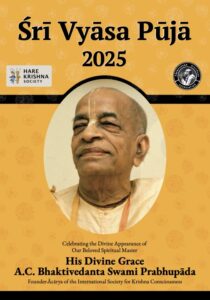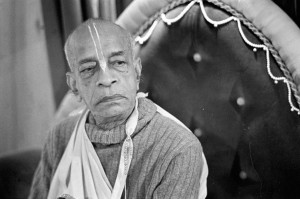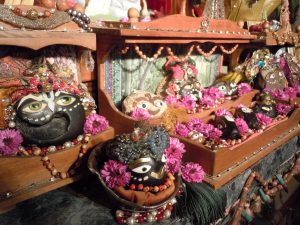Hare Krsna-below we have entered many different conversations and quotes all relating to one topic-How only a madman thinks he or she is independent in this world to do as they please.
July 5 1976 Wash DC conversationsVṛṣākapi: I was thinking that they are talking of independence, but they cannot even become independent of old age and disease. Their body, they try to control things, but their own body is out of control.
Prabhupāda: So many things.
Puṣṭa Kṛṣṇa: One may say that if there’s no independence, then where is the question of initiative in the material world, taking initiative?Prabhupāda: Initiative? What is that question? Initiative I understand, but do you think that by taking initiative of independence you become independent, like this, by dancing and fireworks, you become independent? This is initiative, dancing like dogs, (sings) “We are independent, we are independent.” (laughter) Does it have any meaning? Dance like a dog, that’s all.
Hari-śauri: It’s a big show, that’s all.
Yadubara: They will say that they can do so many things.
Prabhupāda: What they can do? They cannot do anything. At any moment, you can be kicked out, “Get out.”
Yadubara: But they have choice within māyā. Isn’t that a fact?Prabhupāda: Choice?
Yadubara: Choice what to do in the material world, many different fields. They will say that they can do this or that.
Prabhupāda: Many fields, that is also conditioned. That is conditioned, that is not independence.
Hari-śauri: One has choice to become a dog or a cat, or…
Prabhupāda: Everything is conditioned. Therefore it is called conditioned life. There is no question of independence. That is foolishness. That is explained in the Bhagavad-gītā, that they are not independent, completely under the control of laws of material nature, and still they are thinking independent.
Rūpānuga: It is like a prisoner in the prison house thinking he has some freedom.
Prabhupāda: That freedom is danda jane raja jana nadi secu bhau.(?) Drowning the man in the water and, “Now you have independence, so breathe.” (laughter) So he breathes in, “Ah! Ah!” “All right, you are now a little relieved, all right, again. Again become drown.” “Oh! Save me, save me, save me, save me.” “All right,” take out, “now breathe, independently.“ This is independence. Danda jane raj jana nadi secu bhai.(?) The rascal does not know “I am breathing independent, but at any moment I can be drowned again.” Very correct example, danda jane raja jana nadi secu bhai.(?) No independence. Independence is only there when you fully surrender to Kṛṣṇa. You surrender your all independence to Kṛṣṇa. Then there is. “Kṛṣṇa, I have foolishly acted as independent, so many lives. Now I surrender all my independence at Your lotus feet. If You like, You can kill me; if You like, You can…,” that is independence. Otherwise, there is no independence. All foolishness. Ahaṅkāra-vimūḍhātmā. By false egotism, he’s thinking that “I am independent.”
1.)London Aug 31 1973
Prabhupāda: So, in this way, as soon as we understand or become convinced that I am not this body, then spiritual education begins. (If) I am different, then the next question will be, then what for I am working? Naturally at the present moment we are working for this body, maintenance of the body. For eating, sleeping, having facility for sex life or sense gratification and to protect this body from being harmed. This is our business. But if I am not this body, then, I am spirit soul, then the next question will be, what I am doing for the spirit soul? When actually I am working for this body because I, spirit soul, is within this body. Just like we are keeping this room fit for habitation because I am living here. Three months or four months ago we are not in possession of this room. So we were not anxious about this room. Because we were not living. So actually I am keeping my body fit, nice, just to live within this body. Therefore actually I do not love this body, I love myself. And to keep myself in a nice position, I love this room or this house. My main business is to get me, as I am, comfortable. Not that it is my business to keep this house neat and clean only. No. No, my business is to keep myself fit. So actually I love my soul. Then if you analyze, studying your soul, what is the constitution, you’ll find the soul is part and parcel of God. Then you come to the platform that you love the soul because you love God. The ultimate issue is God. As you love this body because you love the soul, similarly you love the soul because you love God. And that is now lost. We are embarrassed in the affairs of loving this body. The background we have forgotten. This is our present stage. Therefore we are in confusion. There is no satisfaction.
2.) June 20 1972 class….Gāy gauracand madhu sware. This is a song sung by Bhaktivinoda Ṭhākura. He says that Lord Caitanya, Gaura, Gaura means Lord Caitanya, Gaurasundara, the fair complexion. Gāy gauracand madhur sware. In sweet voice, He is singing mahā-mantra, Hare Kṛṣṇa, Hare Kṛṣṇa, Kṛṣṇa Kṛṣṇa, Hare Hare/ Hare Rāma, Hare Rāma, Rāma Rāma, Hare Hare.In very sweet song He’s singing, and it is our duty to follow His footsteps to sing the mahā-mantra. So Bhaktivinoda Ṭhākura advises, gṛhe thāko, vane thāko, sadā ‘hari’ bole’ ḍāko. Gṛhe thāko means either you stay at your home as a householder, or you stay in the forest as the renounced order of life, it does not make difference, but you have to chant the mahā-mantra, Hare Kṛṣṇa. Gṛhe vane thāko, sadā ‘hari’ bole’ ḍāko. Always chant this mahā-mantra. Sukhe duḥkhe bhulo nā’ko, “Do not forget chanting either in distress or in happiness.” Vadane hari-nāma koro re. So far chanting (is concerned), there cannot be any check, because in whatever condition I may be, I can go on chanting this mahā-mantra, Hare Kṛṣṇa, Hare Kṛṣṇa, Kṛṣṇa Kṛṣṇa, Hare Hare/ Hare Rāma, Hare Rāma, Rāma Rāma, Hare Hare.So Bhaktivinoda Ṭhākura advises, “Never mind, you are in distress or happiness, but go on chanting this mahā-mantra.” Māyā-jāle baddha ho’ye, ācho miche kāja lo’ye. You are entrapped by the network of illusory energy, māyā-jāle baddha ho’ye, just like the fisherman catches from the sea all kinds of creatures within the network. Similarly we are also within the net of illusory energy, and because we have no freedom, therefore all our activities are useless. Action in freedom has got some meaning, but when we are not free within the clutches of māya, within the network of māyā, then our so-called freedom has no value. Therefore, whatever we are doing is simply defeat. Without knowing our constitutional position, if you are forced to do something by the pressure of the illusory energy, it is simply useless waste of time. Therefore, Bhaktivinoda Ṭhākura says, “Now you have got full consciousness in the human form of life. So just chant Hare Kṛṣṇa, Rādhā-Mādhava, all these names. There is no loss or great profit.” Jīvana hoilo śeṣa, nā bhajile hṛṣīkeśa. Now gradually everyone is on the verge of death, nobody can say that, “I shall remain, I shall stay for more hundred years.” No, any moment we can die. Therefore, he advises jīvana hoilo śeṣa: “Our life is at end at any moment, and we could not serve Hṛṣīkeśa, Kṛṣṇa. Bhaktivinodopadeśa.” Therefore Bhaktivinoda Ṭhākura advises, ekbār nām-rase māto re: “Please be enchanted, nām-rase, in the mellow of chanting the transcendental name. Dive yourself within this ocean. That is my request.”
3.) April 13 1973 LAWe have got our spiritual body. That is now covered by the material dress, subtle dress and gross dress. So if we give up the propensity for material sense gratification, that is mukti. So long we have a pinch, a drop of desire to enjoy material happiness, we’ll have to accept a body, different types of body, out of the 8,400,000. But if we become satisfied with service of Kṛṣṇa, then we have no more interest with this material happiness. That is mukti. When we shall be detestful with this material happiness… Kṛṣṇa will give you all facility. He’ll give you facilities, whatever you want. Ye yathā māṁ prapadyante tāṁs tathaiva bhajāmy a… [Bg. 4.11]. Therefore we see varieties of life. It is arranged by Kṛṣṇa through the agency of material potency. Prakṛteḥ kriyamāṇāni guṇaiḥ karmāṇi sar… [Bg. 3.27]. It is going on. But if we say, “Kṛṣṇa…,” to Kṛṣṇa, “Now, from this day, I surrender unto You. My Lord, I don’t want anything material,” then you are mukta, liberated. And if you keep the standard, māyā will not touch you. Just after giving up this body, you go back to home, back to Godhead. It is very easy.
Some Conclusions-The above lecture Prabhupada explains in a very logical way that because we are at present in our bodies, is why we love our bodies, and being part and parcel of God-Krsna, means we also love Krsna, but at present we are forgetful of this eternal position. The next lecture he very nicely explains how action without freedom- has NO meaning. He gives the example of Bhaktivinode Thakur who tells us that fish within the net of the fisherman are tossing around but that movement and activity has no meaning. Why? Because they are caught up by the fishermans net and are sure to die. Therefore no freedom. Same with us, if we are “forced” by the pressure of the illusory energy of God, Maya to act in some way, then how is that freedom? It is not freedom but simply actions due to previous karmic reactions.
Hare Krsna
damaghosa das————————
BG 2.41 purport…When one is engaged in the duties of Kṛṣṇa consciousness, he need not act in relationship to the material world with obligations to family traditions, humanity, or nationality. Fruitive activities are the engagements of one’s reactions from past good or bad deeds.
And the last one Prabhupada is telling us that if we learn how to surrender to God-Krsna, then Maya will no longer touch us, and we will go back home back to Godhead. This means we will want nothing material, not even a pinch of material desire, then we can go back Home.
—————————-BG 2.41 purport…When one is engaged in the duties of Kṛṣṇa consciousness, he need not act in relationship to the material world with obligations to family traditions, humanity, or nationality. Fruitive activities are the engagements of one’s reactions from past good or bad deeds.
BG 3.27 purport-Two persons, one in Kṛṣṇa consciousness and the other in material consciousness, working on the same level, may appear to be working on the same platform, but there is a wide gulf of difference in their respective positions. The person in material consciousness is convinced by false ego that he is the doer of everything. He does not know that the mechanism of the body is produced by material nature, which works under the supervision of the Supreme Lord. The materialistic person has no knowledge that ultimately he is under the control of Kṛṣṇa. The person in false ego takes all credit for doing everything independantly, and that is the symptom of his nescience. He does not know that this gross and subtle body is the creation of material nature, under the order of the Supreme Personality of Godhead, … The ignorant man .. due to his long misuse of the senses in sense gratification, he is factually bewildered by the false ego, which makes him forget his eternal relationship with Kṛṣṇa.
BG 3.39 purport...Advancement of material civilization on the basis of sense gratification means increasing the duration of the material existence of a living entity. Therefore, this lust is the symbol of ignorance by which the living entity is kept within the material world. While one enjoys sense gratification, it may be that there is some feeling of happiness, but actually that so-called feeling of happiness is the ultimate enemy of the sense enjoyer.
BG 4.14 purport…The living entity is responsible for his own acts. The Lord only gives him facilities, through the agency of material nature, the external energy. Anyone who is fully conversant with all the intricacies of this law of karma, or fruitive activities, does not become affected by the results of his activities. In other words, the person who understands this transcendental nature of the Lord is an experienced man in Kṛṣṇa consciousness, and thus he is never subjected to the laws of karma.
BG 4.17 purport-If one is serious about liberation from material bondage, one has to understand the distinctions between action, inaction and unauthorized actions. One has to apply oneself to such an analysis of action, reaction and perverted actions because it is a very difficult subject matter. To understand Kṛṣṇa consciousness and action according to the modes, one has to learn one’s relationship with the Supreme; i.e., one who has learned perfectly knows that every living entity is the eternal servitor of the Lord and that consequently one has to act in Kṛṣṇa consciousness. The entire Bhagavad-gītā is directed toward this conclusion.
BG 4.18 purport-A person acting in Kṛṣṇa consciousness is naturally free from the bonds of karma. His activities are all performed for Kṛṣṇa; therefore he does not enjoy or suffer any of the effects of work. … Because everything is done for Kṛṣṇa, he enjoys only transcendental happiness in the discharge of this service. Those who are engaged in this process are known to be without desire for personal sense gratification. The sense of eternal servitorship to Kṛṣṇa makes one immune to all sorts of reactionary elements of work.
BG 4.35 purport…For want of sufficient knowledge in the absolute science, we are now covered with illusion, and therefore we think that we are separate from Kṛṣṇa. Although we are separated parts of Kṛṣṇa, we are nevertheless not different from Him. The bodily difference of the living entities is māyā, or not actual fact. We are all meant to satisfy Kṛṣṇa.
BG 5. 8-9 purport-A person in Kṛṣṇa consciousness is pure in his existence, and consequently he has nothing to do with any work which depends upon five immediate and remote causes: the doer, the work, the situation, the endeavor and fortune. This is because he is engaged in the loving transcendental service of Kṛṣṇa. Although he appears to be acting with his body and senses, he is always conscious of his actual position, which is spiritual engagement. In material consciousness, the senses are engaged in sense gratification, but in Kṛṣṇa consciousness the senses are engaged in the satisfaction of Kṛṣṇa’s senses. Therefore, the Kṛṣṇa conscious person is always free, even though he appears to be engaged in things of the senses. Activities such as seeing, hearing, speaking, evacuating, etc., are actions of the senses meant for work. A Kṛṣṇa consciousness person is never affected by the actions of the senses. He cannot perform any act except in the service of the Lord because he knows that he is the eternal servitor of the Lord.
BG 5.11 purport-Śrī Rūpa Gosvāmī in his Bhakti-rasāmṛta-sindhu describes this as follows:īhā yasya harer dāsye karmaṇā manasā girā nikhilāsv apy avasthāsu jīvanmuktaḥ sa ucyateA person acting in Kṛṣṇa consciousness (or, in other words, in the service of Kṛṣṇa) with his body, mind, intelligence and words is a liberated person even within the material world, although he may be engaged in many so-called material activities. He has no false ego, nor does he believe that he is this material body, nor that he possesses the body. He knows that he is not this body and that this body does not belong to him. He himself belongs to Kṛṣṇa, and the body too belongs to Kṛṣṇa. When he applies everything produced of the body, mind, intelligence, words, life, wealth, etc.—whatever he may have within his possession—to Kṛṣṇa’s service, he is at once dovetailed with Kṛṣṇa. He is one with Kṛṣṇa and is devoid of the false ego that leads one to believe that he is the body, etc. This is the perfect stage of Kṛṣṇa consciousness.
BG 5.14-The embodied spirit, master of the city of his body, does not create activities, nor does he induce people to act, nor does he create the fruits of action. All this is enacted by the modes of material nature.
PURPORT-The living entity, as will be explained in the Seventh Chapter, is one in nature with the Supreme Lord, distinguished from matter, which is another nature—called inferior—of the Lord. Somehow, the superior nature, the living entity, has been in contact with material nature since time immemorial. The temporary body or material dwelling place which he obtains is the cause of varieties of activities and their resultant reactions. Living in such a conditional atmosphere, one suffers the results of the activities of the body by identifying himself (in ignorance) with the body. It is ignorance acquired from time immemorial that is the cause of bodily suffering and distress. As soon as the living entity becomes aloof from the activities of the body, he becomes free from the reactions as well. As long as he is in the city of body, he appears to be the master of it, but actually he is neither its proprietor nor controller of its actions and reactions. He is simply in the midst of the material ocean, struggling for existence. The waves of the ocean are tossing him, and he has no control over them. His best solution is to get out of the water by transcendental Kṛṣṇa consciousness. That alone will save him from all turmoil.



